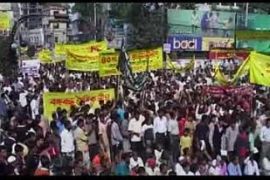Troops deployed in Bangladesh
The country’s president defends the step; opposition describes it as “uncalled for”.

In a televised speech to the nation late on Sunday, President Ahmed said army had been engaged to help the civil administration to maintain law and order in the run-up to the election.
He said: “I call upon the people to extend all out co-operation to the army so that they can fulfil their task.
“I hope political parties will put the country ahead of everything and will participate in the coming election solving disputes through negotiation.”
Separately, a home ministry statement on Sunday said the army was called in to aid the civil administration, and “to avert any unwarranted situation on the eve of coming general election”.
Repeated strikes
Bangladesh has been repeatedly paralysed over the past two months by the protests, organised by an alliance of 14 political parties that is demanding electoral reforms in advance of elections scheduled for January 23.
Police also indefinitely banned public gatherings or protests around the presidential palace in downtown Dhaka, and armoured vehicles took up positions around colonial-era building on Sunday.
The alliance, led by former Sheikh Hasina, a former prime minister, had threatened to march on Sunday on the palace unless their demands for changes to the country’s election commission were met. The protest was later postponed.
Hasina said she was surprised by the move, and that “the situation did not call for it”.
She said on Sunday after a meeting with alliance leaders: “It’s unjust. We withdrew our programme to march on the palace.”
Move welcomed
But a four-party coalition led by Hasina’s rival, Khaleda Zia, the former prime minister, welcomed the president’s decision. Zia stepped down at the end of her term in October so an interim government could take over to oversee the elections, as Bangladesh’s constitution stipulates.
“The government has met most of their demands, but when they threatened to lay siege to the president’s office, he was forced to take action,” Mannan Bhuiyan, a coalition spokesman, said. “We believe he took the right decision.”
The opposition alliance wants the removal of two election commissioners who it accuses of bias towards Zia. Under Bangladesh’s constitution, election officials cannot be sacked, but must resign or go on leave.
The alliance also has demanded a revised voter list, saying the current one contains duplicate and fake names, and favours Zia.
The election commission has started revising the disputed voter list and has postponed next month’s general elections by two days until January 23.
But the alliance says that is not enough.
Retired Major-General Syed Muhammad Ibrahim, a political analyst, called the army’s deployment “premature”, adding that it “is not good for the political future of the country”.
In the capital on Sunday, soldiers started setting up camps in community halls and parks, and were checking cars in high-security areas around government offices.
Despite the military presence, life continued normally with shops open and people going about their ordinary business. Sunday is a working day in Muslim-majority Bangladesh.
Government’s pledge
Meanwhile, the government promised to continue with efforts to solve the crisis.
“We have initiated a number of steps, but we are yet to implement those fully,” CM Shafi Sami, a government spokesman, said late on Saturday after meetings with the president.
However, Hasan Mashud Chowdhury, a former army chief who is now an adviser to the Iajuddin-led caretaker government, said the troop deployment could hamper the government’s efforts to resolve the political crisis.
“But we’ll have to accept the reality, and also monitor that the purpose [of the deployment] is being served.”